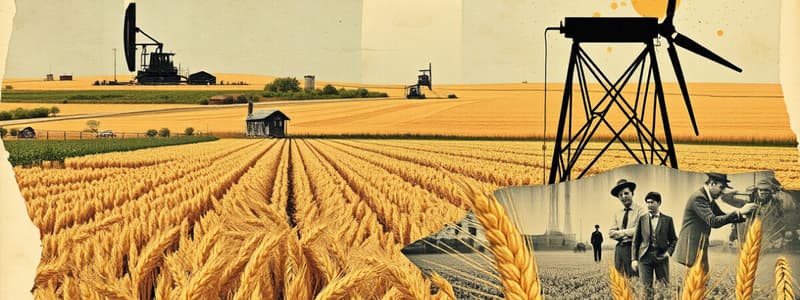Podcast
Questions and Answers
What role do fossil fuels and nitrogen-based fertilizers play in modern civilization?
What role do fossil fuels and nitrogen-based fertilizers play in modern civilization?
- They are primarily used for transportation purposes.
- They have no significant impact on economic growth.
- They are solely responsible for technological advances.
- They enable efficient storage of energy for human prosperity. (correct)
How does the author suggest viewing the concept of Money?
How does the author suggest viewing the concept of Money?
- As a fixed value solely tied to gold.
- Through the lens of various financial proxies. (correct)
- As an irrelevant factor in modern economies.
- In relation to historical forms of currency only.
What is implied about the relationship between carbon and nitrogen in today's economies?
What is implied about the relationship between carbon and nitrogen in today's economies?
- They significantly influence global economic conditions. (correct)
- They only affect agricultural practices.
- They are obsolete and have no relevance.
- Their impact is mostly environmental rather than economic.
What was the average labour requirement per hectare for wheat farming in 1801?
What was the average labour requirement per hectare for wheat farming in 1801?
Which year showed the first implementation of mechanical harvesting in wheat farming?
Which year showed the first implementation of mechanical harvesting in wheat farming?
Which of the following was a significant advancement in wheat farming by 2021?
Which of the following was a significant advancement in wheat farming by 2021?
What factor primarily contributed to the increase in agriculture efficiency as indicated in the content?
What factor primarily contributed to the increase in agriculture efficiency as indicated in the content?
What method was used for extracting grain in 1901?
What method was used for extracting grain in 1901?
How have scientific breakthroughs in fossil fuels and nitrogen-based fertilizers predominantly impacted the financial system?
How have scientific breakthroughs in fossil fuels and nitrogen-based fertilizers predominantly impacted the financial system?
What key function of Money as a Proxy has proven resilient despite dilution over the years?
What key function of Money as a Proxy has proven resilient despite dilution over the years?
Which of the following statements about the role of carbon and nitrogen in modern economies is correct?
Which of the following statements about the role of carbon and nitrogen in modern economies is correct?
Which farming method demonstrated the greatest reduction in man hours per hectare from 1901 to 2021?
Which farming method demonstrated the greatest reduction in man hours per hectare from 1901 to 2021?
How did the yield of wheat per hectare change from 1901 to 2021?
How did the yield of wheat per hectare change from 1901 to 2021?
What was a key factor in reducing the time needed for harvesting wheat by 2021?
What was a key factor in reducing the time needed for harvesting wheat by 2021?
In terms of agricultural advancements, what was a significant benefit provided by nitrogen fertilizers?
In terms of agricultural advancements, what was a significant benefit provided by nitrogen fertilizers?
In comparing the farming methods of 1901 and 2021, what was the primary change in seed fertilization?
In comparing the farming methods of 1901 and 2021, what was the primary change in seed fertilization?
Which aspect of Money's function is highlighted as being crucial in relation to the dynamics of the banking system?
Which aspect of Money's function is highlighted as being crucial in relation to the dynamics of the banking system?
How do carbon and nitrogen influence demographic trends and global economies as presented in the content?
How do carbon and nitrogen influence demographic trends and global economies as presented in the content?
Flashcards are hidden until you start studying
Study Notes
Fossil Fuels and Nitrogen Cycle
- Fossil fuels have leveraged ancient carbon cycles for modern energy needs.
- Synthesis of nitrogen allows for the creation of fertilizers, accelerating the Nitrogen Cycle.
Advancements in Wheat Farming Efficiency
- Significant improvements in wheat farming over the last two centuries, as illustrated in various historical time frames.
Wheat Farming in 1801
- Location: Genesee Valley, New York.
- Labour: 147 hours per hectare using 2 oxen and wooden ploughs with manual seeding.
- Yield: 1.0 tonne per hectare.
- Efficiency: 600 seconds to produce 2 loaves of bread.
Wheat Farming in 1901
- Location: Red River Valley, North Dakota.
- Labour: 22 hours per hectare with 4 horses and steel ploughs using mechanical seed drills.
- Yield: 1.0 tonne per hectare.
- Efficiency: 90 seconds to produce 2 loaves of bread, with mechanical harvesting and steam engines for grain extraction.
Wheat Farming in 2021
- Location: Arkansas River Valley, Kansas.
- Labour: 2 hours per hectare using 400 horsepower tractors for planting and fertilizer application.
- Yield: 3.5 tonnes per hectare, markedly increased productivity.
- Efficiency: 2 seconds to produce 2 loaves of bread, utilizing combine tractors for harvesting.
Impact of Scientific Discoveries
- Scientific advancements and mechanization have drastically reduced labor intensity and energy input in food production.
- These advancements have simplified farming work and increased food output.
Financial Implications of Agricultural Advancements
- Enhanced energy storage due to fossil fuel discoveries has bolstered human prosperity.
- Increased agricultural efficiency contributes to the generation of new money, influencing its role as a proxy.
- The dilution of money stock over recent decades is counterbalanced by these scientific breakthroughs.
Connection to Global Economies
- Carbon and nitrogen play crucial roles in the global economy, impacting population growth and life expectancy.
- Understanding the financial sphere, starting with banking systems, is essential to comprehending money's function amid these advancements.
Fossil Fuels and Nitrogen Cycle
- Fossil fuels have leveraged ancient carbon cycles for modern energy needs.
- Synthesis of nitrogen allows for the creation of fertilizers, accelerating the Nitrogen Cycle.
Advancements in Wheat Farming Efficiency
- Significant improvements in wheat farming over the last two centuries, as illustrated in various historical time frames.
Wheat Farming in 1801
- Location: Genesee Valley, New York.
- Labour: 147 hours per hectare using 2 oxen and wooden ploughs with manual seeding.
- Yield: 1.0 tonne per hectare.
- Efficiency: 600 seconds to produce 2 loaves of bread.
Wheat Farming in 1901
- Location: Red River Valley, North Dakota.
- Labour: 22 hours per hectare with 4 horses and steel ploughs using mechanical seed drills.
- Yield: 1.0 tonne per hectare.
- Efficiency: 90 seconds to produce 2 loaves of bread, with mechanical harvesting and steam engines for grain extraction.
Wheat Farming in 2021
- Location: Arkansas River Valley, Kansas.
- Labour: 2 hours per hectare using 400 horsepower tractors for planting and fertilizer application.
- Yield: 3.5 tonnes per hectare, markedly increased productivity.
- Efficiency: 2 seconds to produce 2 loaves of bread, utilizing combine tractors for harvesting.
Impact of Scientific Discoveries
- Scientific advancements and mechanization have drastically reduced labor intensity and energy input in food production.
- These advancements have simplified farming work and increased food output.
Financial Implications of Agricultural Advancements
- Enhanced energy storage due to fossil fuel discoveries has bolstered human prosperity.
- Increased agricultural efficiency contributes to the generation of new money, influencing its role as a proxy.
- The dilution of money stock over recent decades is counterbalanced by these scientific breakthroughs.
Connection to Global Economies
- Carbon and nitrogen play crucial roles in the global economy, impacting population growth and life expectancy.
- Understanding the financial sphere, starting with banking systems, is essential to comprehending money's function amid these advancements.
Fossil Fuels and Nitrogen Cycle
- Fossil fuels have leveraged ancient carbon cycles for modern energy needs.
- Synthesis of nitrogen allows for the creation of fertilizers, accelerating the Nitrogen Cycle.
Advancements in Wheat Farming Efficiency
- Significant improvements in wheat farming over the last two centuries, as illustrated in various historical time frames.
Wheat Farming in 1801
- Location: Genesee Valley, New York.
- Labour: 147 hours per hectare using 2 oxen and wooden ploughs with manual seeding.
- Yield: 1.0 tonne per hectare.
- Efficiency: 600 seconds to produce 2 loaves of bread.
Wheat Farming in 1901
- Location: Red River Valley, North Dakota.
- Labour: 22 hours per hectare with 4 horses and steel ploughs using mechanical seed drills.
- Yield: 1.0 tonne per hectare.
- Efficiency: 90 seconds to produce 2 loaves of bread, with mechanical harvesting and steam engines for grain extraction.
Wheat Farming in 2021
- Location: Arkansas River Valley, Kansas.
- Labour: 2 hours per hectare using 400 horsepower tractors for planting and fertilizer application.
- Yield: 3.5 tonnes per hectare, markedly increased productivity.
- Efficiency: 2 seconds to produce 2 loaves of bread, utilizing combine tractors for harvesting.
Impact of Scientific Discoveries
- Scientific advancements and mechanization have drastically reduced labor intensity and energy input in food production.
- These advancements have simplified farming work and increased food output.
Financial Implications of Agricultural Advancements
- Enhanced energy storage due to fossil fuel discoveries has bolstered human prosperity.
- Increased agricultural efficiency contributes to the generation of new money, influencing its role as a proxy.
- The dilution of money stock over recent decades is counterbalanced by these scientific breakthroughs.
Connection to Global Economies
- Carbon and nitrogen play crucial roles in the global economy, impacting population growth and life expectancy.
- Understanding the financial sphere, starting with banking systems, is essential to comprehending money's function amid these advancements.
Studying That Suits You
Use AI to generate personalized quizzes and flashcards to suit your learning preferences.




